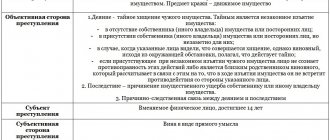Despite the fact that the standard of living is declining, the number of burglaries in Russia has recently decreased. However, one should not be consoled by this fact, because the number of episodes annually exceeds 100,000. Thieves identify apartments of wealthy people based on several criteria: the presence of air conditioning, satellite dishes, insulation of housing, expensive doors. In addition, attacks based on a tip are possible.
Single thefts are more common than acts committed by a group of people. Typically, criminals collectively act on a tip if there is actually a lot of property on the premises that is of interest to thieves. In addition, acts without prior agreement are possible.
These types of cases are complex and legal proceedings can take a long time. If you need the help of a qualified lawyer, our specialists are ready to help.
Criminal punishment for theft by a group of persons
The classification of acts and punishment for theft are provided for in Art. 158 of the Criminal Code of the Russian Federation, and for illegal actions committed by a group of persons - in Art. 35 of the Criminal Code of the Russian Federation. Crimes of this kind are determined by several criteria, the key ones being:
- number of participants;
- existence of a preliminary conspiracy;
- damage caused as a result of theft.
The peculiarity of the theft as such is its secret nature and the absence of bodily injury or other harm to the health of the victim. If such acts are accompanied by beatings, proceedings are initiated under Art. 161 for robbery. If a crime is committed with the use of a weapon, liability will arise under Art. 162 for robbery.
Theft without aggravating factors is qualified under Part 1 of Art. 158 of the Criminal Code of the Russian Federation. It provides for the following penalties:
- a fine in the amount of 200,000 rubles or the income of the attackers for 18 months;
- correctional labor for up to 2 years;
- imprisonment for up to 5 years.
However, the commission of theft by a group of persons by prior conspiracy is an aggravating factor. It is indicated in Part 2 of Art. 158 of the Criminal Code of the Russian Federation. In this case, the fine increases to 200 thousand rubles, and the prison term - up to five years.
If the act was committed by an organized group, then Part 4 of Art. 158 of the Criminal Code of the Russian Federation. The maximum penalty is 10 years in prison and a fine of up to one million rubles.
Note!
The amount of property lost as a result of theft also affects the punishment. If the damage is large—more than 250 thousand rubles—then the attacker faces a fine of up to 500 thousand rubles or up to 6 years. In case of particularly large damage - more than a million rubles - the fine increases to a million rubles, and the term - up to 10 years.
It is important to know that theft cannot always be classified as committed by a group of persons, even if there were two or more participants. The exceptions to the situation are as follows:
- if the group included a person under the age of 14 years. For example, if teenagers aged 15 and 13, as well as an adult, committed a crime, it will be considered single;
- if the theft was committed by one person, and the others acted as instigators.
Therefore, the investigation will still have to evaluate many circumstances in order to classify the theft as an act committed by a group of persons.
Criminal liability
The minimum punishment for theft with illegal entry into premises is a fine of 700 to 1000 minimum wages or in the amount of salary for a period of 7 to 12 months. In aggravating circumstances, burglary is punishable by a term of imprisonment of 2 to 6 years and a maximum fine of up to 50 minimum wages or in the amount of salary or other income for 1 month.
Therefore, the punishment for burglary in 2021 has not changed. Exemption from criminal liability can only be a person’s insanity or age under 14 years.
In cases where an attacker entered the premises by breaking the lock, damaging walls, safes, his actions are additionally qualified as destruction or damage to property , according to Article 167 of the Criminal Code of the Russian Federation. This entails an increase in prison term and fine.
Punishment of accomplices
Responsibility for burglary by two or more persons occurs when they all enter the premises together , as well as in the event that one person entered and the others contributed to this and participated in the seizure of property. Complicity makes it easier to commit a crime and conceal it. In addition, in such cases, the victim often suffers more significant material damage, and the methods of entering the premises become more sophisticated and dangerous.
When a theft is carried out by a group of people, locks, roofs, walls, doors are broken, and keys are selected. When assessing the activities of accomplices, the court must establish the existence of a causal connection between the actions of the entire group and the perpetrator, as well as the fact that they contributed to the criminal outcome. At the same time, the goals and motives of the organizer, instigator and accomplice sometimes do not coincide with the goals of the performer. The latter always has selfish motives, and the accomplice may be guided by other motives. However, this does not affect the classification of the crime. All perpetrators are held criminally liable under Article 34 and Part 3 of Article 158 of the Criminal Code of the Russian Federation.
The conspiracy is considered preliminary if it was reached before the start of the crime. The form of agreement can be not only oral or written. It is also achieved through gestures, facial expressions and even silent consent.
The punishment for each perpetrator of the crime will depend on the assessment of the evidence regarding each perpetrator and accomplice of the burglary.
Aggravating circumstances
Aggravating circumstances that may affect a harsher sentence for burglary include:
- Large amount of theft (more than 500 minimum wages).
- Causing significant damage to the victim.
- Participation of an organized group in a crime.
- Repeated crime.
All types of thefts in Russian criminal law are regulated by just one article - 158th. The classification of crimes is complicated by the fact that there is no concept of “burglary” in the legislation. In this regard, the very fact of breaking the lock has virtually no effect on the final verdict. On the other hand, if illegal entry into a home is proven, this becomes an aggravating circumstance in which the offender faces up to 6 years in prison. Only those criminals who fully admitted guilt and returned the stolen property to the rightful owner can hope for a mitigation of punishment.
Theft committed by a group of persons by prior conspiracy
If the theft was committed by a group of persons by prior conspiracy, Part 2 of Art. 35 of the Criminal Code of the Russian Federation. This legal act defines conspiracy as a preliminary agreement between all attackers.
The investigation will have to prove the fact of collusion. This can be done if there are witnesses or a confession from one of the group members. Also, the investigation may reveal facts indicating the fact of preparation of the act, for example, advance purchase of camouflage means, drawing up an action plan, etc. It may be accepted by the court as an aggravating circumstance.
What is theft?
Theft is the secret theft of someone else's property without the knowledge of its owner for personal gain (that is, for the purpose of making a profit). Theft can be safely recognized as one of the most diverse and multifaceted offenses in the Criminal Code of the Russian Federation - its forms are extremely numerous, and it can be carried out using a variety of methods.
The Criminal Code of the Russian Federation provides for a separate article under number 158 of the Criminal Code of the Russian Federation for such a crime as theft. It contains four parts, each of which describes a variety of offenses:
- Part one describes standard thefts without any special features or aggravating circumstances;
- Part two describes thefts committed by several citizens in conspiracy, from clothes or bags, from non-residential premises, as well as any thefts that caused harm to a citizen;
- Part three examines thefts from some structures provided for the supply of resources (oil pipeline, gas pipeline, etc.). She also considers thefts from residential premises or on a large scale (more than 250,000 rubles);
- Part four examines the last two types of thefts - committed by an Organized Crime Group or on a particularly large scale (more than one million rubles).
Without prior agreement
Since theft committed by a group of persons by prior conspiracy is an aggravating circumstance, lawyers often insist that there was no conspiracy. A typical example of such a situation is when two people, without planning their actions, snatch a wallet or cut off a cable they just noticed.
Note!
The absence of prior agreement will allow the perpetrators to avoid the maximum punishment for the act. Most likely, the case will be limited to correctional labor, a suspended sentence or a minimum sentence.
Burglary
The most popular type of theft is residential theft. It is housing that most often becomes the object of close attention of intruders. Large amounts of property stored in residential premises often attract criminal groups. Responsibility for burglary, like any other, comes under Art. 158 of the Criminal Code of the Russian Federation. However, cases of this kind have their own characteristics.
- Regardless of the composition of the participants and how long they have known each other, burglary is always classified as an act committed by prior conspiracy.
- the aggravating factor in such cases is penetration into the victim’s home, which leads to the imposition of a more serious punishment;
- It is impossible to resolve the issue with the owners on the spot; the police are obliged to arrest persons, initiate a criminal case and go to court to choose a preventive measure.
Burglary is one of the most serious crimes, so you won’t be able to get by with “mild” penalties. The offender will be given a sanction based on the amount of damage he caused.
general characteristics
The article is of great importance for law enforcement practice, as it establishes a number of rules common to the section and explains the concept of “theft” - the unlawful seizure of property by a criminal for his own benefit for personal gain without any reciprocal property provision, which caused damage to the owner.
What is the definition of theft? What are its defining characteristics? For example, embezzlement or embezzlement are “official” crimes; robbery - open theft, but without the use of violence; robbery is robbery plus violence; in fraud, the criminal ingratiates himself into the trust of the victim and takes possession of his property through deception.
The main characteristic of theft is the secret method of removal. At the same time, the qualification under Art. 158, if the criminal believed his actions were secret, but they were not actually them (there was an unnoticed witness), or those present were misled about the intentions of the convicted person (he acted secretly in relation to them).
Amendments to parole - changes in criminal legislation
Shoplifting by a group of people
Shoplifting is a special category of crime. The main reason is the lack of possibility of criminal prosecution. In the vast majority of cases, criminals steal a small amount of property. Its amount, as a rule, does not exceed the limit values established for initiating a criminal case, therefore administrative liability often arises.
If the damage does not exceed 1,000 rubles, the attacker faces a fine of up to five times the value of the stolen property, but not less than 1,000 rubles, arrest for up to 15 days, or compulsory labor for up to 50 hours.
If the damage ranged from 1,000 to 2,500 rubles, one of the following penalties will be imposed: a fine of up to five times the value of the stolen property, but not less than 3,000 rubles, arrest from 10 to 15 days, or compulsory labor for up to 120 hours.
However, if a group of persons participated in the case, the act will in any case be qualified under Art. 158 of the Criminal Code of the Russian Federation, since there is an aggravating factor.
Note!
Not always shoplifting can be classified as a breaking and entering crime. Unlike an apartment, a store is a public place, which means that during its operation there is no talk of intrusion. It’s another matter if the attackers visited the outlet after it was closed.
In question-answer format
How serious is such a crime as theft considered under current legislation (Article 158 of the Criminal Code of the Russian Federation, Part 2)? The punishment and term have changed in 2021; can the defendant apply for a special procedure for considering the case?
According to the classification given in Art. 15 of the Criminal Code of the Russian Federation, different parts of the article fall under different categories of crimes under the current Criminal Code: minor gravity, moderate, grave and especially grave. Differentiation (determining how serious a crime is) is made by the severity of the punishment.
For example, ordinary, unskilled theft (part 1), since the imprisonment for it does not exceed two years, is a crime of minor gravity. And here is part 2, that is, qualified theft, but without serious aggravating circumstances, this is a crime of moderate gravity. At the same time, according to Art. 314 of the Code of Criminal Procedure of the Russian Federation in all parts, punishment can be imposed without trial. A special procedure is applied if the punishment provided for by the sanction of the article does not exceed 10 years.
Punishments and terms under this article have not changed in 2021.
What is the penalty for theft? What is the punishment given if we are convicted?
The punishment depends on which part of this norm the citizen is held accountable for; the sanctions are very different. Thus, in practice, for “simple” theft, the vast majority of punishments are imposed that are not related to actual imprisonment. If a citizen is judged under Part 2, the likelihood of imprisonment increases, but still remains low.
The commission of a crime by a person who already has a criminal record constitutes a recidivism, which is punished more severely. In this case, the convicted person may already receive a real sentence.
How is Art. 158 part 2 of the Criminal Code of the Russian Federation, is it possible to reconcile the parties and stop the persecution?
Since the crimes provided for in Part 2 of this article are, according to the classification of the Criminal Code of the Russian Federation, crimes of medium gravity, reconciliation and termination of the case are allowed in accordance with Art. 76.
Burglary in a group
This is a common way to illegally obtain someone else's property. But Art. 158 of the Criminal Code of the Russian Federation does not provide for such a thing as hacking. In accordance with the law, this is unauthorized entry of third parties into private or government property. At the same time, the methods used by the attackers have virtually no effect on the severity of the punishment.
For a theft to be classified as a burglary, individuals do not even need to enter the premises. For example, if property was stolen using improvised means (magnet, rope, other devices), it will still be considered burglary with all the ensuing consequences. However, a break-in will not take place if the attackers entered the premises legally (for example, they had keys to the warehouse).
Theft and embezzlement
The most common misconception about theft is that it is often equated with theft. This is true to some extent, but not entirely.
Theft is the main term through which the essence of almost all crimes of the Criminal Code against property, their basic and general content is revealed. What is different in such crimes is the external expression of criminal acts.
Theft will be the selfish, illegal, gratuitous seizure and conversion of someone else's property for the benefit of the thief or other people, resulting in damage.
Theft is a theft that occurred secretly for the owner and other persons who could have witnessed what was happening.










